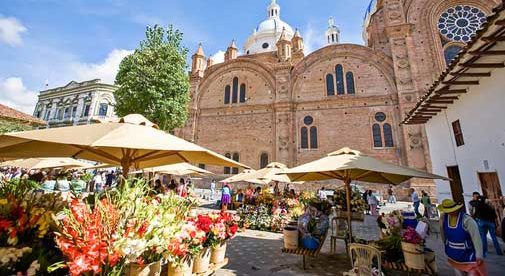1. You Can Live Like Royalty
I live like a queen. I live off my social security, on $1,800 a month. That budget includes having a maid and gardener and going out to lunch or dinner once a week. I don’t need A/C or heat. When it’s hot, I open a window. When it’s cool, I shut the window. If there’s an extra cold night, I light up my fireplace and drink a glass of wine while warming my feet. I buy three tanks of propane for $2.50 each to fire up my stove, water heater, and dryer which lasts me around a month. So, I save around $290 a month on electricity alone compared to what I spent back in the U.S.
Also taken off my list here is cleaning toilets, sweeping up bags full of dog fur, deep cleaning my kitchen, and shining up windows, as the cleaners come every other week. My gardener keeps my roses, hydrangeas, hedges, and lawn in perfect order. That leaves me time to get mani-pedis or go for long lunches. The maids charge $40 per visit for two people who clean for four hours and the gardener is $20 per visit and comes twice a month.
My other monthly bills include $70 for high-speed fiber optic internet from Puntonet, $25 for water and garbage pickup from Etapa, $70 for electricity from Centrosur, and $80 for IESS health insurance. My food bill is around $400 a month because I have four dogs and a cat who prefer expensive imported food, which takes up half the budget. I am not a good cook and would starve if it weren’t for the home delivery I can get from just about any restaurant in town.
I own a house that I bought at half the cost I’d pay in the U.S., but buying a house is not necessary here as rentals run around $450 to $650 for good apartments or houses in nice neighborhoods.
I save the rest of my budget for traveling and go see the family in the U.S. two to three times a year. I also like to pack in a couple of trips to resorts or adventure outings around Ecuador or abroad.
2. The Just-Right Climate
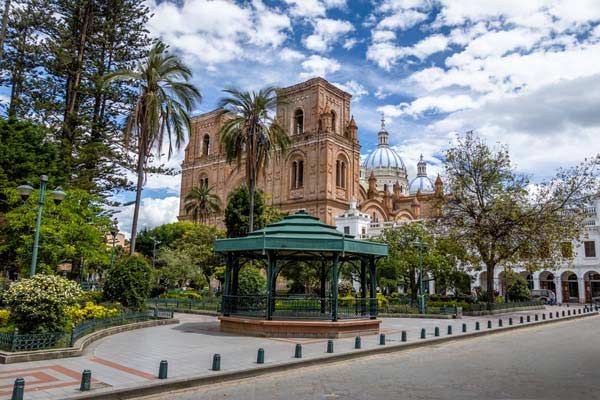
Here in Cuenca, the weather is not too cold, not too hot, it’s just right. Seniors used to flock to Florida to retire but now with temperatures capable of reaching 170 F inside your parked car—hot enough to scramble eggs—many are reconsidering their relocation plans.
After 40 years of living like a mole in Florida, I searched for a location with spring- and fall-like weather year-round and Cuenca appeared on my radar thanks to International Living. Now after living here for six years, I can attest to its near-perfect weather. It’s in the Andes, but because it’s situated near the Equator, the geologic mash-up makes for temperatures ranging from mid-50s F in the morning reaching mid-70s F during the day. Because of its proximity to the sun, it feels warmer during the day than the temperature reflects.
I can walk my dog along the miles of trails lining the four rivers surrounding the city any time during the day without worrying about my tennis shoes sticking to the pavement. Because the weather is so temperate, I can hike, play pickleball, shop at tiendas, or sit outside at outdoor cafés any time during the day all year long. My mole days are over.
3. A “Driving Miss Daisy” Lifestyle
I am chauffeured around and don’t need a car. I was born in Louisiana, where we joke that upon birth you get your driver’s license. I started driving at 14 with my learner’s permit and never once considered not having a car. Then I moved to Cuenca, where you don’t need one. I can hop in a taxi and go almost anywhere around town for no more than $3.50. I can also catch a city bus or ride the new tram to get around town for 35 cents.
When I want to go out of town with friends, there’s planned bus trips for outings to nearby towns, orchid farms, Gualaceo’s silver shops, trips to Girón’s waterfalls, and more. We also stop at local restaurants to enjoy fresh organic vegetables and grilled trout, all for $25 including the bus, trip, and meal.
When I want to spoil myself, I schedule a trip to Vilcabamba’s Izhcayluma Eco Lodge where, for $130, their van will pick me up at my door and shuttle me back and forth to the resort where for three nights, I stay in a cabin with hammocks everywhere, enjoy complimentary organic breakfasts, go hiking, and enjoy $25 massages. There’s trips like this to places all over Ecuador, so you can go to the coast for whale-watching or to the Amazon forest without worrying about renting a car.
I have found I like living the “Driving Miss Daisy” lifestyle. There’s no worry about insurance, blown out tires, or costly repairs—and with the money I save, I can be escorted all over the place without the car owning my pocketbook.
4. Enjoying the Great Outdoors
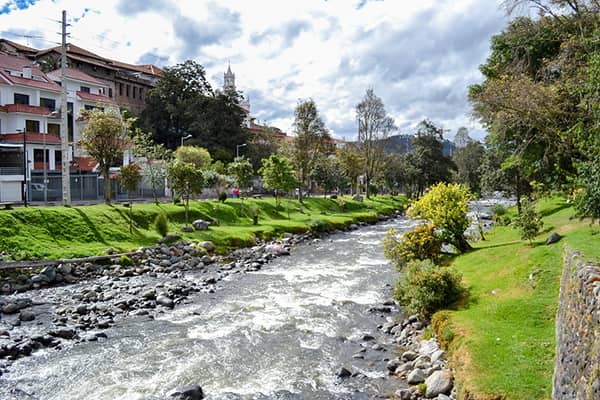
I have an active lifestyle and a no-brainer weight-loss program. The expat community is vibrant in Ecuador, with 10,000 of us providing plenty of opportunities to find friends with similar interests. I’m an outdoorsy girl, so I belong to a hiking club which offers outings weekly where I can explore indigenous villages, walk on paths made by cows, and spot a llama or two. I also have picked up playing pickleball (picture playing tennis with a whiffle ball) and it’s the most fun workout I’ve ever had.
My friend Sandy and I are prolific walkers, spending Saturdays running errands around town and logging 10,000 steps on our Fitbits. The ability to be more active has knocked my weight down 20 pounds, and I have pretty much tossed meds for diabetes and don’t need blood pressure pills—or any pills for that matter.
5. Beautiful Surroundings
I am enthralled with the amazing architecture here. Cuenca is the most beautiful city in Ecuador and the cultural center where art and music abound, which is why tourism has risen 30% over the last five years. It’s a UNESCO Heritage site known for its 16th century Spanish colonial and 18th century French republic architecture—the Parisian influence is seen in the historic district’s town squares located throughout the city.
There’s a historic architectural tour brochure you get from the tourist office located next to the Cathedral of the Immaculate Conception with its baby-blue domes.
I spend days wandering around town gazing at the more than 233 historic structures which remind me of New Orleans with their wrought-iron balconies filled with flowers. But don’t just look at the outside of the buildings, because behind those elaborate story-high wooden doors lies interiors that show the flair of the Spanish and French people who inspired the architecture.
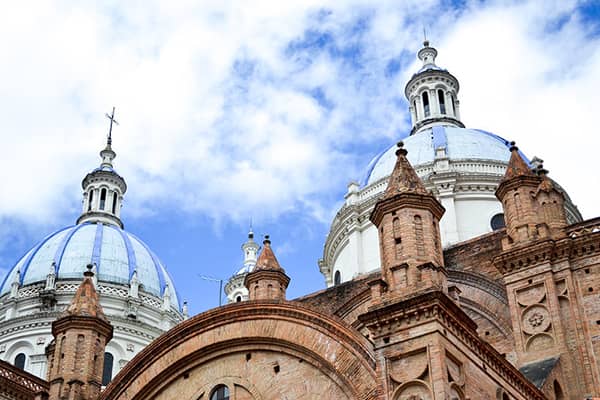
Here’s a Couple of Reasons Why Cuenca May Not Be Right For You…
1. The Weather Can Be Rainy
For me, the climate here is a plus but if you want beachside living which is similar to Florida, Cuenca may not be your cup of tea. It can get cold here for those that chill easily. January through May is the rainy season, but the rain rarely lasts all day, it’s usually only for a few hours during the afternoon.
Typically the weather is mild but very mercurial, and you’ll experience all four seasons in just one day. So, the cold doesn’t last months like you’re living in Minnesota. It’s only going to be cold early morning and after sunset. You’ll be layering up and down like a stripper. But those heavy winter coats will just take up room in your closet unless you plan on scaling Mt. Cotopaxi. If you’re cold-blooded, do what us Cuencanos do and go to Salinas for the beaches or Montecito for whale-watching when you need a break from the chill.
2. You Can’t Change the Culture, You Have to Adapt
If you are someone that flinches when someone is 10 minutes late, unless you can adjust to the tranquillo lifestyle, the Spanish culture can get under your skin. “Mañana” does NOT mean “tomorrow”, it just means “sometime in the future”. And if you have a time set for the plumber to come by to fix your water heater, it’s just a suggestion. If there’s a soccer game on, all bets are off on when he’ll get there.
Spanish is the language here, so you may get frustrated trying to communicate what you need until you get some lessons under your belt. Unless you’re an expert at charades, your gestures will be met with curious stares. There’s usually someone around who speaks some English, but it’s best to have your Google translate handy. If you can’t stand waiting for your meal to be served at restaurants, remember dining is an occasion not a fast-food experience so it will be slow. Ecuadorians think nothing of three-hour dinners—what’s the rush? You’re there to enjoy your friends as much as the food.
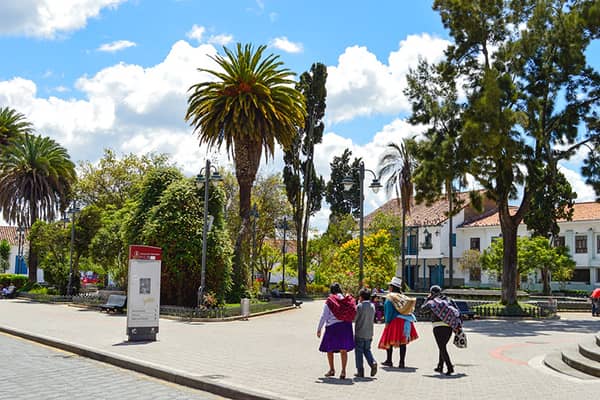
Ecuador is getting savvier as tourism grows, but it’s still a developing country. Pipes are being upgraded around town, so keep a five-gallon jug of water around in case your water is temporarily shut down. At times when they are working near your house putting up new electrical lines or internet cables, you may be out of business for a while. There’s lots of hot spots for internet around town, so you can always grab some lunch while waiting and log on to your computer or smartphone at nearby restaurants or parks. Structural work is scheduled in advance and the local online Spanish newspapers, which are automatically translated to English when you log on, lists times when they will be working in your neighborhood. But because time is relative in Ecuador, don’t expect the work scheduled to be on time.
Remember, this is not the United States. It’s slower and less time-sensitive. But it’s also kinder, and more tranquillo. Once you catch on to this, and start becoming tranquillo yourself, you’ll find yourself just saying “It’s Ecuador” and not be bothered.
But there’s no changing the culture and so it’s important to find out if the idiosyncrasies will drive you nuts. Try the culture on for a month or two before moving to see if you can adjust. After you live here a while, you won’t want the culture to change and won’t miss the hustle and bustle of a frenetic life or the fact that there’s not a Starbucks on every corner.
Soon you’ll just say, “See you mañana” whether you mean it or not.


